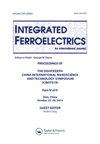Phase Formation, Morphology and Electrical Properties of Lead-Free BNBLT-xBSN Ceramics Synthesized via the Solid-State Combustion Technique
IF 0.7
4区 工程技术
Q4 ENGINEERING, ELECTRICAL & ELECTRONIC
引用次数: 0
Abstract
AbstractLead-free 1-x(Bi0.47Na0.47Ba0.06)0.95La0.05TiO3-xBa(Sn0.70Nb0.24)O3 (BNBLT-xBSN) ceramics with x = 0, 0.01, 0.02, 0.03 and 0.04 mol.% were synthesized by the solid-state combustion technique with a calcination temperature of 750 °C for 2 h and a sintering temperature of 1150 °C for 2 h. The effect of BSN substitution on the phase formation, microstructure, dielectric, ferroelectric and energy storage properties of the BNBLT ceramics was investigated. With the substitution of BSN, the coexisting rhombohedral (R) and tetragonal (T) phases transformed into coexisting R and cubic (C) phase, verified by Rietveld refinement. The C phase increased with increased BSN content. The average grain size decreased from 1.14 to 0.89 µm when x increased to 0.03 and then increased to 0.96 µm. The measured density and maximum dielectric constant (εm) tended to increase from 5.44 to 5.87 g/cm3 and 1800 to 1942 when x increased to 0.03, then decreased to 5.25 g/cm3 and 1501, respectively. The remanent polarization (Pr) and coercive field (Ec) decreased when x increased to 0.03. The 0.97BNBLT-0.03BSN ceramic exhibited the lowest energy loss density (Wloss ∼ 0.10 J/cm3) and the highest energy-storage efficiency (η ∼ 77.3%) measured under an electric field of 70 kV/cm.Keywords: BNBLT-xBSNcombustiondielectricferroelectricenergy storage AcknowledgmentsThe authors thank the Department of Physics, Faculty of Science, Naresuan University for their supporting facilities. Thanks are also given to Asst. Prof. Dr. Kyle V. Lopin for his help in editing the manuscript.Disclosure StatementNo potential conflict of interest was reported by the author(s).Additional informationFundingThis work was supported by Naresuan University (NU) and National Science, Research and Innovation Fund (NSRF) with Grant No. R2567B001. The works of N. Vittayakorn was funded by KMITL under Grant No. KREF116501.固态燃烧技术合成无铅BNBLT-xBSN陶瓷的相形成、形貌和电性能
摘要采用固体燃烧技术,在750℃煅烧2 h, 1150℃烧结2 h的条件下,合成了x = 0、0.01、0.02、0.03和0.04 mol.%的1-x(Bi0.47Na0.47Ba0.06)0.95La0.05TiO3-xBa(Sn0.70Nb0.24)O3 (BNBLT- xbsn)无铅陶瓷,研究了BSN取代对BNBLT陶瓷相形成、微观结构、介电、铁电和储能性能的影响。通过BSN的替换,将共存的菱形(R)和四方(T)相转变为共存的R和立方(C)相,并通过Rietveld细化进行验证。随着BSN含量的增加,C相增加。当x增大到0.03时,平均晶粒尺寸从1.14减小到0.89µm,再增大到0.96µm。当x增大到0.03时,测得的密度和最大介电常数εm分别从5.44增大到5.87 g/cm3和1800增大到1942,然后分别减小到5.25 g/cm3和1501。当x增大到0.03时,残余极化(Pr)和矫顽力场(Ec)减小。在70 kV/cm的电场下,0.97BNBLT-0.03BSN陶瓷具有最低的能量损失密度(Wloss ~ 0.10 J/cm3)和最高的储能效率(η ~ 77.3%)。关键词:bnblt - xbsn燃烧介质铁电储能致谢作者感谢河南大学理学院物理系提供的配套设施。同时感谢Kyle V. Lopin博士助理教授对本文的编辑工作的帮助。披露声明作者未报告潜在的利益冲突。本研究由南京大学(NU)和国家科学研究与创新基金(NSRF)资助,批准号:R2567B001。N. Vittayakorn的作品是由KMITL在授权号下资助的。KREF116501。
本文章由计算机程序翻译,如有差异,请以英文原文为准。
求助全文
约1分钟内获得全文
求助全文
来源期刊

Integrated Ferroelectrics
工程技术-工程:电子与电气
CiteScore
1.40
自引率
0.00%
发文量
179
审稿时长
3 months
期刊介绍:
Integrated Ferroelectrics provides an international, interdisciplinary forum for electronic engineers and physicists as well as process and systems engineers, ceramicists, and chemists who are involved in research, design, development, manufacturing and utilization of integrated ferroelectric devices. Such devices unite ferroelectric films and semiconductor integrated circuit chips. The result is a new family of electronic devices, which combine the unique nonvolatile memory, pyroelectric, piezoelectric, photorefractive, radiation-hard, acoustic and/or dielectric properties of ferroelectric materials with the dynamic memory, logic and/or amplification properties and miniaturization and low-cost advantages of semiconductor i.c. technology.
 求助内容:
求助内容: 应助结果提醒方式:
应助结果提醒方式:


